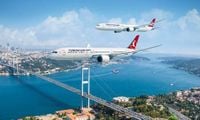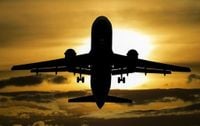Turkish Airlines, long celebrated for its extensive global reach, is embarking on one of the most ambitious fleet expansions in aviation history. On Friday, September 26, 2025, the airline announced a landmark agreement with Boeing to acquire up to 225 new aircraft, a move that signals not just growth, but a strategic leap toward operational excellence and sustainability.
The deal, finalized after months of negotiations, includes 75 wide-body Boeing 787 Dreamliners—comprised of 50 firm orders and 25 options—scheduled for delivery between 2029 and 2034. Additionally, Turkish Airlines has completed talks for 150 narrow-body Boeing 737-8 and 737-10 MAX jets, with 100 firm orders and 50 options. The finalization of the 737 MAX order, however, hinges on the successful conclusion of ongoing discussions with engine supplier CFM International, as reported by The Hans India and other outlets.
According to a statement released by Turkish Airlines and cited in AP News, the company is in active negotiations with engine manufacturers Rolls-Royce and GE Aerospace for the procurement of engines, spare parts, and maintenance services for the new wide-body aircraft. This attention to detail underscores the airline’s commitment to ensuring that its expansion is both technologically advanced and operationally robust.
The timing of the announcement was notable—coming just a day after Turkish President Recep Tayyip Erdogan met with U.S. President Donald Trump in Washington. Multiple sources, including Reuters and AP News, highlighted that the aircraft deal was reportedly among the topics discussed during the high-level meeting. This context adds a layer of diplomatic significance to the agreement, underscoring the strategic partnership between Turkey and the United States and the long-standing cooperation between Turkish Airlines and Boeing.
Turkish Airlines Chairman of the Board and Executive Committee, Prof. Ahmet Bolat, emphasized the broader impact of the agreement. “This landmark agreement represents much more than a fleet growth. It is a reflection of our leadership in the industry as well as our dedication to innovation and operational excellence. The addition of these advanced Boeing aircraft to our fleet will not only enhance our operational capabilities but also become a significant element supporting Turkish Airlines’ 2033 Vision of expanding our fleet to 800 aircraft,” Bolat said, as quoted by The Hans India and Simple Flying.
The airline’s “Vision 2033”—marking its centennial—aims to expand its fleet to over 800 aircraft, with a focus on next-generation, fuel-efficient models. The plan is ambitious: Turkish Airlines wants 90% of its fleet to be composed of next-generation aircraft by 2033, reaching 100% by 2035. This strategy not only positions the airline for continued leadership in the fiercely competitive global aviation market, but also demonstrates a clear commitment to sustainability, operational efficiency, and customer service.
Stephanie Pope, President and CEO of Boeing Commercial Airplanes, expressed her pride in the enduring partnership. “We are honored that Turkish Airlines has once again chosen the 787 Dreamliner and 737 MAX to power its future growth. As a proud partner to Türkiye and the Turkish aviation industry for 80 years, we look forward to continuing our support of Turkish Airlines as they expand operations and deliver exceptional experiences to their passengers,” Pope stated, according to Simple Flying.
Currently, Turkish Airlines operates more than 200 Boeing jets, including the 787-9, 777, 737 MAX, Next-Generation 737, and 777 Freighter models. The addition of the larger 787-10 Dreamliner will enable the airline to increase both passenger and cargo capacity, particularly on high-demand long-haul routes connecting Istanbul to destinations across the United States, Africa, Southeast Asia, and the Middle East. The Dreamliner family is renowned for its advanced aerodynamics, lightweight composite materials, and up to 25% improvement in fuel efficiency compared to previous generations—factors that will help reduce operating costs and environmental impact.
The 737 MAX aircraft, on the other hand, will bolster Turkish Airlines’ efficiency and flexibility on short- and medium-haul routes. These jets are designed for better fuel efficiency, reduced maintenance costs, and increased reliability, which are crucial for maintaining the airline’s competitive edge in both regional and international markets. The increased cargo capacity of the 737 MAX models will also reinforce the airline’s status as a leading air cargo carrier, especially through its strategic hub in Istanbul.
Beyond the technical and operational details, the expansion has significant implications for the broader Turkish aviation ecosystem. Ahmet Bolat highlighted this point, noting, “With this agreement, while advancing our close collaboration with the world’s leading aircraft manufacturers, we will continue to support the development of Türkiye’s aviation ecosystem. Moreover, by offering greater connectivity and more long-haul destinations, these aircraft will help attract more visitors to discover our country’s unique cultural heritage and natural beauty, thereby further strengthening Türkiye’s tourism sector.”
The order is also expected to have a ripple effect across the U.S. economy. As noted in a Boeing press release cited by Simple Flying, the deal will “support more than 123,000 jobs across the United States.” While the specific price tag for the order remains undisclosed, the sheer scale of the transaction marks it as one of the largest single-aisle jet orders in Boeing’s history.
For Turkish Airlines, this expansion is about more than just numbers. It’s a strategic move to reinforce its leadership in the global aviation sector, enhance passenger comfort, and drive down costs through cutting-edge technology and fuel efficiency. The airline’s focus on sustainability is clear, with the Dreamliner’s superior fuel economy and reduced carbon footprint playing a central role in its future operations.
The agreement also stands as a testament to the resilient partnership between Turkish Airlines and Boeing, a relationship that has endured for over eight decades. As the airline prepares to celebrate its 100th anniversary, it is setting the stage for a new era—one defined by innovation, sustainability, and a relentless pursuit of excellence.
With the ink barely dry on the deal, Turkish Airlines is already looking ahead, confident that these new aircraft will not only meet the growing demands of global travelers but also cement its status as a leader in both passenger and cargo transport. As the aviation world watches closely, one thing is certain: Turkish Airlines is not just expanding its fleet—it’s charting a bold new course for the future of air travel.


